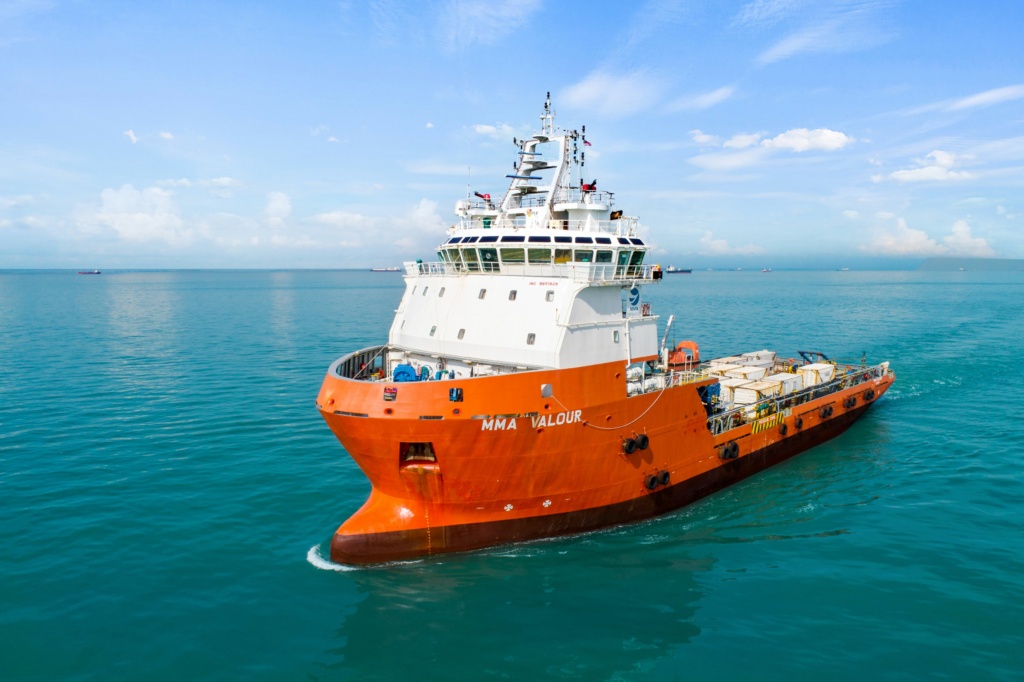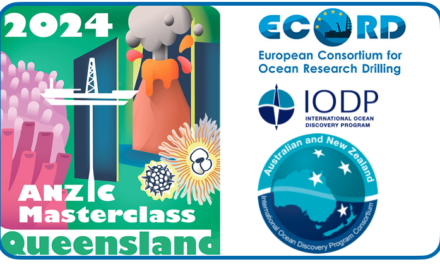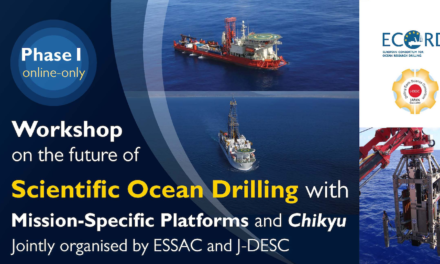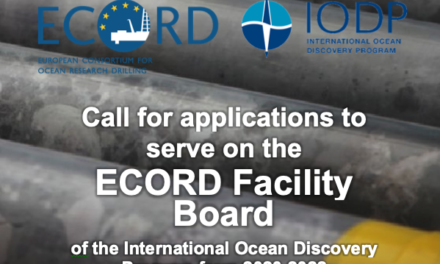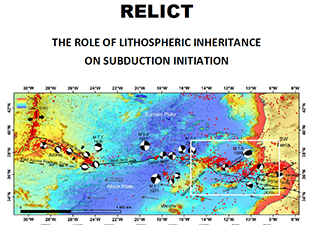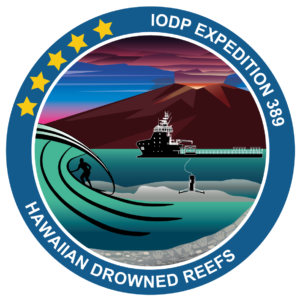
IODP Expedition 389: Hawaiian Drowned Reefs
Fossil coral reefs as a window into the past and future
Start of an international expedition off the coast of Hawai’i
The offshore phase of the IODP Expedition 389
will be conducted from 31 August till 31 October 2023
by the ECORD Science Operator (ESO).
Fossil coral reefs as a window into the past and future
A look back at environmental change throughout geologic history can tell us a lot about the future – especially when it comes to globally and societally important topics such as sea level, climate change and coral reef ecosystem health. An international scientific research expedition, carried out on behalf of the International Ocean Discovery Program (IODP), aims to recover a record of past climate and reef conditions off the coast of Hawai’i (USA). The two-month research expedition will leave the port of Honolulu at the end of August.
Coral reefs are very sensitive to sea level and other changes in environmental conditions. As fossils they provide a record of past conditions over hundreds, thousands and millions of years of Earth’s history. There is, however, a discontinuity in the global record over the past 500,000 years, especially during periods of major and abrupt climate instability. The IODP Expedition 389: Hawai’ian Drowned Reefs focusses on this missing link and is led by Co-chiefs scientists Professor Christina Ravelo (Ocean Sciences Department at the University of California, Santa Cruz, USA) and Professor Jody Webster (School of Geosciences, the University of Sydney, Australia).
“The Hawai‘i fossil reefs are storytellers of the past climate and ocean changes and of the reef ecosystem responses to those changes. These stories can be unlocked through careful study of the fossils that we hope to recover.”
Prof. Christina Ravelo, IODP Exp. 389 Co-chief Scientist
“We hope that information recorded in the fossil reefs will help scientists make improved predictions about the rate and magnitude of sea-level rise, what impact global warming and cooling has on short-term climate phenomena like droughts, floods and marine heat waves, and how coral reef ecosystems respond to these changes.”
Prof. Jody Webster, IODP Exp. 389 Co-chief Scientist
The expedition aims to recover cores from water depths between 134 and 1,155 meters at a maximum of twenty locations. Even though this will be the first time that a seafloor coring system will be deployed in this area, the anticipated sites are well studied.
“We have a very good idea of what the seabed looks like off the coast of Hawai’i based on extensive mapping using underwater sonar, as well as footage and surface samples collected using submersibles and remotely operated diving robots by scientists over the past four decades.”
Prof. Jody Webster, IODP Exp. 389 Co-chief Scientist
“This information has helped us select the best places to carefully collect the cores that will deepen our understanding of the history of the reef system.”
Prof. Christina Ravelo, IODP Exp. 389 Co-chief Scientist
The University of Hawai’i is a partner institution for this expedition and has a strong tradition of science in coral reefs, littoral phenomena, and shoreline geology. Hawai’ian scientists have been studying sea level change and its impacts and have highlighted how this knowledge is important for formulating a mitigation and resilience strategy for the future. Professor Kenna Rubin, Inorganic Geochemist at the University of Hawai’i at Manoa, Department of Earth Sciences, has been involved in planning of the expedition from the beginning and will be a key participant.
“These detailed, high-resolution temporal and compositional records anticipated from this expedition will add greatly to our knowledge of responses to climate change, as well as helping scientists to better understand the volcanic subsidence history of the Big Island. The impacts of this research in Hawai’i will contribute to existing studies of sea level change as recorded here by coral reefs.”
Prof. Kenna Rubin, IODP Exp. 389 participant
The scientific objectives of the expedition aim to address questions on four main topics:
- To measure the extent of sea level change over the past half a million years
- To investigate why sea level and climate changes through time
- To investigate how coral reefs respond to abrupt sea level and climate changes, and
- To improve scientific knowledge of the growth and subsidence of Hawai’i over time.
The planning phase of the expedition includes intensive environmental observations and a comprehensive risk assessment.
In order to recover the material that scientists will use for their analyses in the coming years, a seafloor corer will be deployed off the multipurpose vessel MMA Valour during the expedition. The seafloor corer will be provided and operated by a renowned geotechnical industry specialist, to be lowered to the ocean floor to recover up to maximum 110-meter-long cores beneath the seabed.
The MMA Valour is a versatile multi-purpose platform supply vessel, owned and operated by MMA Offshore, a leading provider of marine and subsea services globally. Headquartered in Perth, Australia, MMA is committed to protecting the world’s marine ecosystems and supporting critical scientific research in this area.
29 scientists from Australia, Austria, China, Denmark, France, Germany, India, Japan, the Netherlands, Great Britain and the USA will participate in the expedition. Ten of them will sail onboard the MMA Valour, leaving Honolulu port on August 31. The offshore phase of the expedition will end on October 31. All science party members will meet for the onshore phase at the IODP Bremen Core Repository, located at MARUM – Center for Marine Environmental Sciences at the University of Bremen (Germany) to split, analyze and sample the cores and interpret the data collected in February 2024.
The cores will be archived and made accessible for further scientific research for the scientific community after a one year-moratorium period following the onshore phase of the expedition. All expedition data will be open access and resulting outcomes published.
The expedition is conducted by the European Consortium for Ocean Research Drilling (ECORD) as part of the International Ocean Discovery Program (IODP). IODP is a publicly-funded international marine research program supported by 21 countries, which explores Earth’s history and dynamics recorded in seafloor sediments and rocks, and monitors sub-seafloor environments. Through multiple platforms – a feature unique to IODP – scientists sample the deep biosphere and sub-seafloor ocean, environmental change, processes and effects, and solid Earth cycles and dynamics.
ECORD Science Operator has great experience working in sensitive ecosystems such as coral reefs, following seagoing expeditions to the Great Barrier Reef (Australia, 2010) and Tahiti (2005).

More information:
Official webpage of Expedition 389:
https://www.ecord.org/expedition389
Expedition 389 blog:
https://expedition389.wordpress.com/
Download official Press Release:
| English |
About the research programme: https://www.iodp.org/
About the European part of the programme: https://www.ecord.org/
About ECORD Science Operator (ESO): https://www.ecord.org/about-ecord/management-structure/eso/
Contact / interviews / images
IODP Exp. 389 Co-chief Scientists:
Professor Christina Ravelo
Ocean Sciences Department at the University of California, Santa Cruz, USA
Email: acr@ucsc.edu
Professor Jody Webster
Geocoastal Research Group, School of Geosciences, University of Sydney, Australia
Email: jody.webster@sydney.edu.au
IODP Exp. 389 Operations:
Dave McInroy
ECORD Science Operator
British Geological Survey
Email: dbm@bgs.ac.uk
Phone: +44 7792 565 801
ECORD Outreach:
Ulrike Prange
ECORD Science Operator – Outreach and Media Relations
MARUM – Center for Marine Environmental Sciences
University of Bremen
Email: uprange@marum.de
Phone: +49 421 218-65540
Photo: MMA Valour – vessel for IODP Expedition 389.
Follow the expedition via:
Twitter (@ECORD_IODP),
Facebook (ECORD.org),
Instagram (@ECORD_IODP),
Youtube (ECORD_IODP) or
Mastodon (@ECORD@mastodon.world),
or the offshore expedition logbook: https://www.expedition389.wordpress.com.

